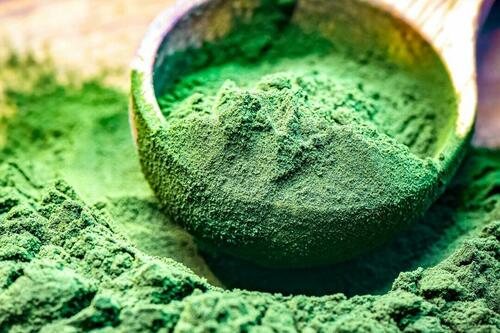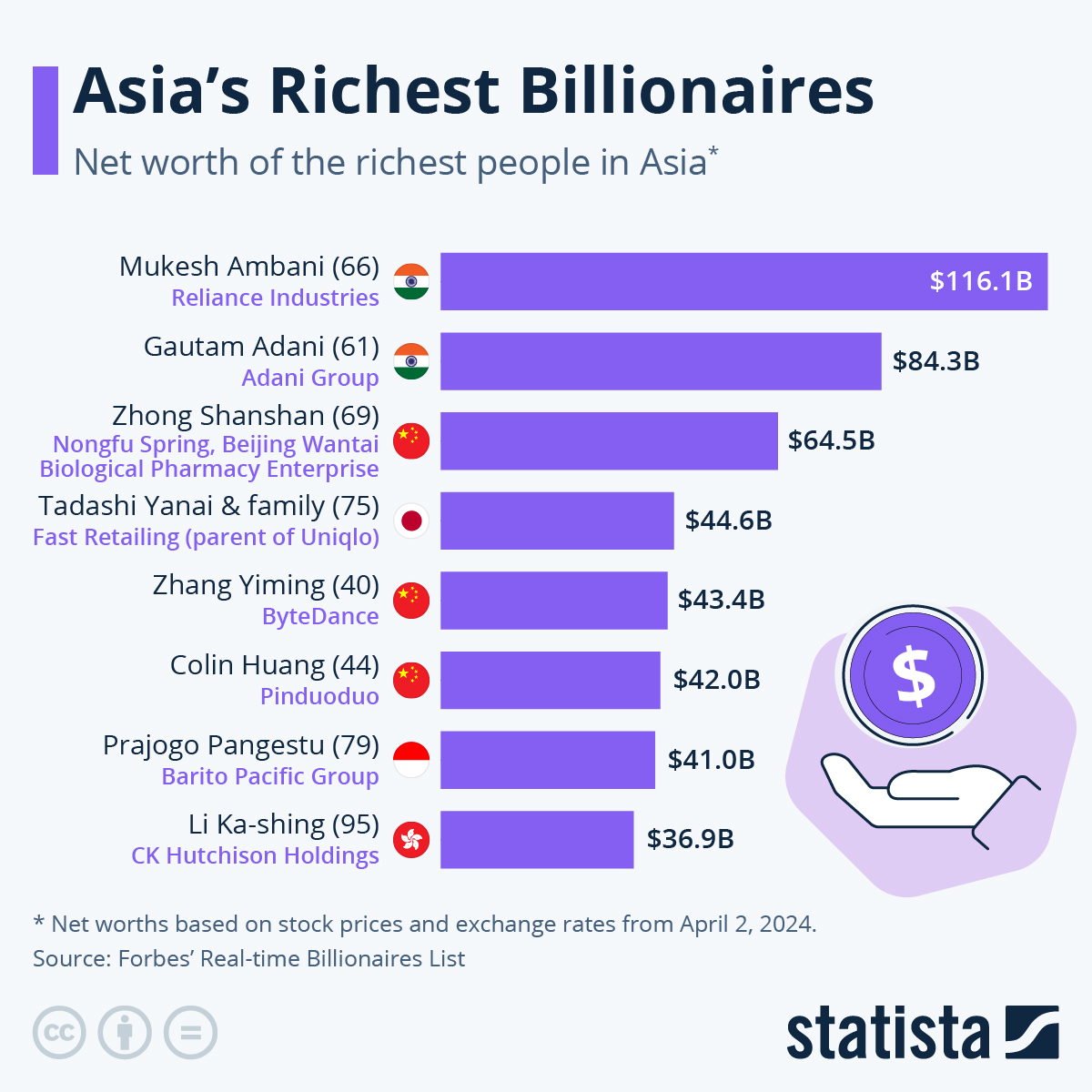Spread & Containment
Spirulina Significantly Reduces COVID-19 Mortality: Study
Spirulina Significantly Reduces COVID-19 Mortality: Study
Authored by Marina Zhang via The Epoch Times (emphasis ours),
Hospitalized COVID-19…

Authored by Marina Zhang via The Epoch Times (emphasis ours),
Hospitalized COVID-19 patients who took spirulina had a lower risk of death than those who did not, according to results of a randomized controlled trial recently published in Frontiers in Immunology.
Study participants took spirulina for six days. No deaths were recorded in the spirulina group, while 15 percent of those who only received standard treatment died.
“The overall results of the present study showed that a six-day course of Spirulina platensis plus the standard treatment of COVID-19 was superior in the recovery of patients compared to standard treatment alone,” the authors wrote.
The study was conducted at two Iranian hospitals, where 189 patients were randomized to take 15.2 grams of spirulina capsules alongside standard COVID-19 treatment or only receive standard treatment. Previous research showed that this dosage of spirulina would provide potent anti-inflammatory and antioxidative effects.
In both the experimental and control groups, half of the patients were in the intensive care unit (ICU), while the other half were in a non-ICU.
Ninety-one participants were assigned to take spirulina. Some withdrew, but there were no deaths. There were 98 people in the control group, 46 of whom were in the non-ICU. Four of these died, alongside 11 ICU patients. All patients received follow-up for seven days.
The authors noticed that the spirulina group had significant reductions in inflammatory markers in their blood and higher oxygen levels.
Both groups received standard treatment, which included antiviral therapy (remdesivir), corticosteroids (dexamethasone), and anticoagulants (heparin or enoxaparin). Patients who rapidly developed inflammatory disease were also given tocilizumab or other steroids to control inflammation.
What Is Spirulina?
Spirulina, or Arthrospira platensis, is a nutrient-dense type of dried-up blue-green algae that can grow in both fresh and marine water environments.
“It doesn’t surprise me that there are benefits from adding this to the diet and regimen of those in hospital,” Dr. Yusuf Saleeby, an integrative medicine doctor and director of Carolina Holistic Medicine not involved in the study, told The Epoch Times.
Spirulina is rich in beta carotene, B-complex vitamins, vitamin E, and minerals such as manganese, copper, zinc, and selenium. “All these are important in maintaining health and a healthy immune system,” he said. It also contains an essential fatty acid called gamma-linolenic acid.
Dr. Saleeby said that functional and integrative medicine uses spirulina, chlorella, and other relatively simple plant foods “to detoxify patients with chronic diseases, toxicities, and poisoning.” Spirulina is found to absorb heavy metals from the body.
Dr. Elias Mazkopakis, director of internal medicine at the Naval Hospital of Crete in Greece, was the first to conduct a worldwide clinical trial on spirulina use in COVID-19.
In his trial, 102 unvaccinated individuals were assigned to take 6 grams of spirulina for six months, while 84 participants in the control group took nothing.
Among those who took spirulina, less than 14 percent contracted COVID-19—caused by the Delta variant at the time of the study—and had only mild symptoms. Two needed hospitalization due to gut problems. In the other group, about 74 percent contracted COVID-19 and experienced mild symptoms, with one-fifth of them requiring hospitalization.
Other Health Benefits
Spirulina has also been shown to help reduce blood lipid and cholesterol levels.
Dr. Mazokopakis’ team has tried spirulina in Greek patients with high blood lipid levels. Participants took 1 gram of spirulina daily; after three months, the team saw decreased blood triglyceride levels and cholesterol. Participants’ blood pressure and weight remained unchanged.
Spirulina may also be liver-protective. Dr. Mazokopakis has also tested spirulina in patients with nonalcoholic fatty liver disease, where he observed a decline in the markers indicating liver diseases.
Additionally, a study in heart disease patients found spirulina supplements could reduce triglycerides and low-density lipoprotein (LDL) cholesterol, considered the “bad” form of cholesterol.
Cancer studies in animals showed that hamsters supplemented with spirulina and beta carotene had reduced tumor growth. A follow-up study in humans showed that 45 percent of patients had a complete regression of leukoplakia—thickened, white patches inside the mouth—after taking spirulina for a year.
Side Effects and Sources
In the Iranian study, researchers observed no side effects but noted that it is difficult for patients to adhere to a daily regimen of high-dose spirulina. To reach 15 grams of spirulina, patients had to consume 19 capsules per day.
Side effects from spirulina may include cramping, bloating, nausea, headaches, and insomnia. People who are allergic to spirulina can develop rashes, and contaminated spirulina may exacerbate autoimmune conditions and lead to blood thinning.
Some people also think spirulina has an unappealing taste. Depending on the environment from which it is harvested, it may taste earthy, bitter, fishy, or salty.
Dr. Saleeby cautioned that sourcing spirulina from trusted brands is essential because it can be adulterated and contaminated with various heavy metals. Freshwater spirulina may be contaminated with toxins produced by other freshwater cyanobacteria in the environment.
In stores, spirulina is often sold as a dried blue-green powder, sometimes packed into capsules or tablets. Because its antioxidizing potential can be easily degraded when it is exposed to heat or sunlight, spirulina must be kept in cool, shaded areas.
International
WHO Official Admits Vaccine Passports May Have Been A Scam
WHO Official Admits Vaccine Passports May Have Been A Scam
Authored by Paul D. Thacker via The Disinformation Chronicle (subscribe here),
The…

Authored by Paul D. Thacker via The Disinformation Chronicle (subscribe here),
The World Health Organization’s Dr. Hanna Nohynek testified in court that she advised her government that vaccine passports were not needed but was ignored, despite explaining that the COVID vaccines did not stop virus transmission and the passports gave a false sense of security. The stunning revelations came to light in a Helsinki courtroom where Finnish citizen Mika Vauhkala is suing after he was denied entry to a café for not having a vaccine passport.
Dr. Nohynek is chief physician at the Finnish Institute for Health and Welfare and serves as the WHO’s chair of Strategic Group of Experts on immunization. Testifying yesterday, she stated that the Finnish Institute for Health knew by the summer of 2021 that the COVID-19 vaccines did not stop virus transmission
During that same 2021 time period, the WHO said it was working to "create an international trusted framework" for safe travel while EU members states began rolling out COVID passports. The EU Digital COVID Certificate Regulation passed in July 2021 and more than 2.3 billion certificates were later issued. Visitors to France were banned if they did not have a valid vaccine passport which citizens had to carry to buy food at stores or to use public transport.
But Dr. Nohynek testified yesterday that her institute advised the Finnish government in late 2021 that COVID passports no longer made sense, yet certificates continued to be required. Finnish journalist Ike Novikoff reported the news yesterday after leaving the Helsinki courtroom where Dr. Nohynek spoke.
Dr. Nohynek’s admission that the government ignored scientific advice to terminate vaccine passports proved shocking as she is widely embraced in global medical circles. Besides chairing the WHO’s strategic advisory group on immunizations, Dr. Nohynek is one of Finland’s top vaccine advisors and serves on the boards of Vaccines Together and the International Vaccine Institute.
The EU’s digital COVID-19 certification helped establish the WHO Global Digital Health Certification Network in July 2023. “By using European best practices we contribute to digital health standards and interoperability globally—to the benefit of those most in need,” stated one EU official.
Finnish citizen Mika Vauhkala created a website discussing his case against Finland’s government where he writes that he launched his lawsuit “to defend basic rights” after he was denied breakfast in December 2021 at a Helsinki café because he did not have a COVID passport even though he was healthy. “The constitution of Finland guarantees that any citizen should not be discriminated against based on health conditions among other things,” Vauhkala states on his website.
Vauhkala’s lawsuit continued today in Helsinki district court where British cardiologist Dr. Aseem Malhotra will testify that, during the COVID pandemic, some authorities and medical professionals supported unethical, coercive, and misinformed policies such as vaccine mandates and vaccine passports, which undermined informed patient consent and evidence-based medical practice.
You can read Dr. Malhotra’s testimony here.
Spread & Containment
Mall retailer considers Chapter 11 bankruptcy as cash dwindles
The popular retail chain has been delisted from the New York Stock Exchange and it has met with its lenders to explore a possible bankruptcy filing.

When retail chains show slowing chains they usually blame one of two boogeymen.
First, there's Amazon. The online retailer has changed how consumers shop, but it has not disrupted brick-and-mortar sales on the level most people believe. Online sales are still a relatively small piece of the overall retail market, according to data from the U.S. Bureau of Labor Statistics (BLS).
"Fourth quarter 2023 e-commerce estimate increased 7.5% (±1.2%) from the fourth quarter of 2022 while total retail sales increased 2.8% (±0.4%) in the same period. E-commerce sales in the fourth quarter of 2023 accounted for 15.6% of total sales," the BLS shared in its quarterly report.
Related: Failed Chapter 11 bankruptcy puts fast food chain in final days
That number has been steady for years, climbing to about 20% during the lockdown period of the pandemic, but never reaching those levels again.
In addition to Amazon and the internet, failing retailers often blame falling mall traffic and that's not really a major issue either.
"Shopping mall foot traffic is nearing pre-pandemic levels, but not everything is the same — that’s a main takeaway from a new white paper by foot traffic analytics firm Placer.ai, titled 'The Comeback of the Mall in 2024.' The white paper finds that during 2023, visits at indoor malls were down 5.8% compared to 2019 — a dramatic improvement from being down more than 15% in 2021," Placer.ai shared.
Open-air shopping centers have done even better as traffic dropped only 1% last year compared to 2019.
"Visits for the shopping center industry at large were down 2.3%, and “foot traffic may yet pick up again in 2024,” according to the report.
Image source: Getty Images
Retail chain faces a cash crunch
Express (EXPR) has struggled and the company had a net loss of $36.8 million in the third quarter, which is a similar number to its $34.4 million net loss in the same quarter a year ago. The company has nearly $500 million in inventory, but only $34.6 million cash and cash equivalents totaled $34.6 million. That's actually an improvement of $10 million from the same period a year ago.
Rapid Ratings, a company which uses publicly-available data to track a company's financial health, has called the company a "high default risk," and has warned its customers "begin mitigating risk."
Express has been working to cut its expenses to preserve liquidity."
"The company is continuing to conduct a comprehensive review of its business model to identify actions that are expected to meaningfully reduce pre-tax costs and enable a more efficient and effective organization and has engaged external advisors to assist in this effort. The company is reiterating its stated goal to deliver over $200 million in annualized savings by 2025 versus 2022," Express shared in its third quarter earnings report.
RapidRatings data, however, does show the company remains at risk for a default, but also had some potentially encouraging remarks.
"Express Inc is situated in our High Risk group, displays weakness in three of our seven performance categories and demonstrates significant underperformance in ROCE. If current trends persist it would be logical to expect that Express Inc will face serious default risk this coming year although prospects for sustainable efficiency and competitiveness are promising over the medium-term; thus, the outlook is mixed," the service shared.
Express explores potential Chapter 11 filing
Express, which sells mid-priced men's and women's clothing, has been meeting with its lenders about funding a potential Chapter 11 bankruptcy filing Bloomberg reported. The company operates 530 Express retail and Express Factory Outlet stores in the United States and Puerto Rico, the Express.com online store and the Express mobile app, approximately 60 Bonobos Guideshop locations and the Bonobos.com online store,and 12 UpWest retail stores and the UpWest.com online store.
The retail chain has roughly $300 million in debt and expects to lose about $120 million for the full year. Express management has not made any public comment on a potential chapter 11 filing.
Express has not had an earnings call with analysts since Nov. 2023. CEO Stewart Glendinning, who joined the company in August 2023, tried to remain optimistic during that call.
"Our third quarter sales and diluted loss per share came in below the low end of our outlook ranges. The macroeconomic environment remains challenging and the consumer and competitive landscapes were highly promotional," he said.
The CEO was honest about the state of the company and its sales efforts.
"In the Express brand, unit sales were consistent with our expectations. However, moving through this inventory required more extensive discounting and led to greater gross margin erosion," he added.
Glendinning admitted that the company made some merchandise and operating mistakes.
"Across the Board, we have opportunities to improve our operating execution. This includes cycle times, in-store execution, sourcing logistics, all parts of our business which allow us to serve customers, lower our cost base and beat the competition. As part of this effort, we expect some rationalization of our store count as we close high effort, unprofitable stores," he shared.
bankruptcy default pandemic lockdown
Spread & Containment
These Are Asia’s Richest Billionaires
These Are Asia’s Richest Billionaires
As of the start of April, Mukesh Ambani (66) is the richest man in Asia, with a net worth of $116.1…

As of the start of April, Mukesh Ambani (66) is the richest man in Asia, with a net worth of $116.1 billion, according to Forbes’ Real-Time Billionaires List,
Ambani is the chairman of Reliance Industries Limited, a conglomerate that focuses not only on petrochemicals, but also textiles and telecommunications. As Statista's Anna Fleck reports, Ambani ranks 11th on Forbes’ worldwide list, which is headed by Bernard Arnault & family (LVMH) with $221.8 billion, Jeff Bezos (Amazon) with $197.5 billion and Elon Musk (Tesla, SpaceX, X formerly Twitter) with $189.0 billion.
You will find more infographics at Statista
In second place - and some 32.8 billion dollars behind - comes 61-year-old Gautam Adani who is the chairperson of the Adani Group, a conglomerate that deals with businesses exporting and importing raw materials and finished goods, including coal trading, mining, oil and gas exploration, as well as ports, energy and agricultural commodities.
He is succeeded by Zhong Shanshan (69), with a net worth of $64.5 billion. Shanshan is the founder of beverages company Nongfu Spring as well as the founder of Beijing Wantai Biological Pharmacy Enterprise, a private Chinese company and major supplier of Covid-19 testing kits.
Rounding off the top ten comes Savitri Jindal (74), the widow of Om Prakash Jindal who founded the Jindal Group in India, whose interests lay in steel, power, cement and infrastructure, with an estimated net worth of $34.8 billion, followed by Shiv Nadar (78), founder and chairman of the IT enterprise HCL Technologies, with $34.5 billion.
The top ten richest people in Asia have a total net worth of $542.1 billion.
-

 International3 weeks ago
International3 weeks agoParexel CEO to retire; CAR-T maker AffyImmune promotes business leader to chief executive
-

 Spread & Containment1 month ago
Spread & Containment1 month agoIFM’s Hat Trick and Reflections On Option-To-Buy M&A
-

 Government1 week ago
Government1 week agoClimate-Con & The Media-Censorship Complex – Part 1
-

 International12 hours ago
International12 hours agoWHO Official Admits Vaccine Passports May Have Been A Scam
-

 Spread & Containment6 days ago
Spread & Containment6 days agoFDA Finally Takes Down Ivermectin Posts After Settlement
-

 Uncategorized2 weeks ago
Uncategorized2 weeks agoVaccinated People Show Long COVID-Like Symptoms With Detectable Spike Proteins: Preprint Study
-

 Uncategorized1 week ago
Uncategorized1 week agoCan language models read the genome? This one decoded mRNA to make better vaccines.
-

 Uncategorized1 week ago
Uncategorized1 week agoWhat’s So Great About The Great Reset, Great Taking, Great Replacement, Great Deflation, & Next Great Depression?










